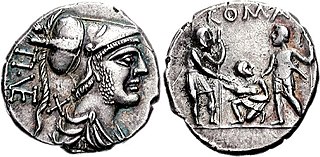Related Research Articles

Lucius Minucius Esquilinus Augurinus was a Roman politician who was consul in 458 BC and decemvir in 450 BC.

The gens Veturia, originally Vetusia, was an ancient patrician family of the Roman Republic. According to tradition, the armourer Mamurius Veturius lived in the time of Numa Pompilius, and made the sacred ancilia. The Veturii occur regularly in the Fasti Consulares of the early Republic, with Gaius Veturius Geminus Cicurinus holding the consulship in 499 BC. Like other old patrician gentes, the Veturii also developed plebeian branches. The family declined in the later Republic, with the last consular Veturius holding office in 206 BC, during the Second Punic War.
The gens Verginia or Virginia was a prominent family at ancient Rome, which from an early period was divided into patrician and plebeian branches. The gens was of great antiquity. It frequently filled the highest honors of the state during the early years of the Republic. The first of the family who obtained the consulship was Opiter Verginius Tricostus in 502 BC, the seventh year of the Republic. The plebeian members of the family were also numbered amongst the early tribunes of the people.
GaiusVeturius Geminus Cicurinus was a Roman Republican politician during the beginning of the 5th century BC. He served as Consul of Rome in 499 BC together with Titus Aebutius Helva. He was a member of the patrician class and of the Veturia gens.
The gens Duilia or Duillia was a plebeian family at ancient Rome. The first of the gens to achieve prominence was Marcus Duilius, tribune of the plebs in BC 470. The family produced several important statesmen over the first three centuries of the Republic, before fading into obscurity.
Aulus Verginius Tricostus Caeliomontanus was a Roman Republican politician and general of the gens Verginia. He served as a Roman consul in 494 BC together with Titus Veturius Geminus Cicurinus.
Titus Veturius Geminus Cicurinus was a Roman Republican patrician politician and general of the gens Veturia. He served as a Roman consul in 494 BC together with Aulus Verginius Tricostus Caeliomontanus.
Lucius Sergius Esquilinus was a Roman politician, and member of the Second Decemvirate in 450 and 449 BC.
Titus Genucius Augurinus was a Roman politician in the 5th century BC, consul and decemvir in 451 BC.
Servius Sulpicius Camerinus Cornutus was a Roman politician in the 5th century BC, consul in 461 BC and decemvir in 451 BC.
Publius Sestius Capitolinus Vaticanus was a Roman politician in the 5th century BC, consul in 452 BC and decemvir in 451 BC.
Titus Romilius Rocus Vaticanus was a Roman politician in the 5th century BC, consul in 455 BC, and decemvir in 451 BC.
Marcus Cornelius Maluginensis was a Roman politician and member of the Second Decemvirate in 450 and 449 BC.
Aulus Manlius Vulso was a Roman politician in the 5th century BC, and was a member of the first college of the decemviri in 451 BC. In 474 BC, he may have been elected consul with Lucius Furius Medullinus. Whether or not the decemvir is the same man as the consul of 474 BC remains unknown.
Caeso Duillius Longus was a Roman politician, a member of the Second Decemvirate in 450 and 449 BC.
Lucius Furius Medullinus was a Roman politician in the 5th century BC, and consul in 474 BC.
Gaius Horatius Pulvillus was a Roman politician during the 5th century BC, who was consul in 477 and 457 BC.
Publius Servilius Priscus was a Roman senator active in the fifth century BC and consul in 463 BC.
Lucius Lucretius Tricipitinus was a Roman senator in the fifth century BC, and was consul with Titus Veturius Geminus Cicurinus in 462 BC.
Publius Lucretius Tricipitinus was a consular tribune of the Roman Republic in 419 and 417 BC.
References
- ↑ Robert Maxwell Ogilvie, Commentary on Livy, books 1–5, Oxford, Clarendon Press, 1965, pp. 404, 405.
- 1 2 3 Broughton 1951, p. 35.
- 1 2 Broughton 1951, p. 36.
- ↑ Livy, Ab urbe condita, III. 8
- ↑ Broughton 1951, p. 35-36.
- ↑ Livy, Ab urbe condita, III.10
- ↑ Dionysius of Halicarnassus, Roman Antiquities , IX. 71
- ↑ Briquel 2000, p. 19.
- ↑ Briquel 2000, p. 193.
- ↑ Diodorus Siculus, Bibliotheca Historica, XII. 9
- ↑ Livy, Ab urbe condita, III. 33
- ↑ Dionysius of Halicarnassus, Roman Antiquities, X. 56
- ↑ Broughton 1951, p. 46.